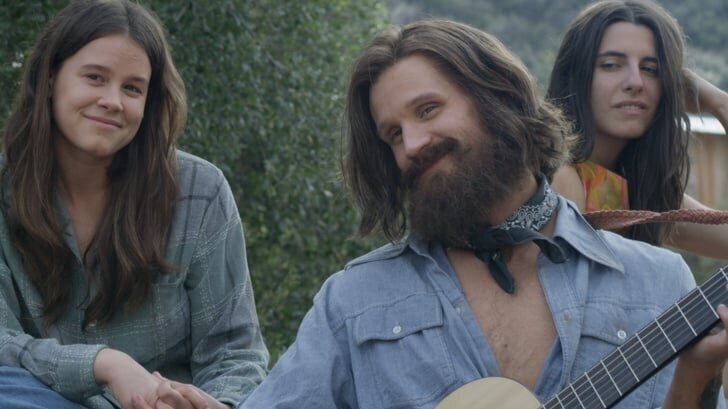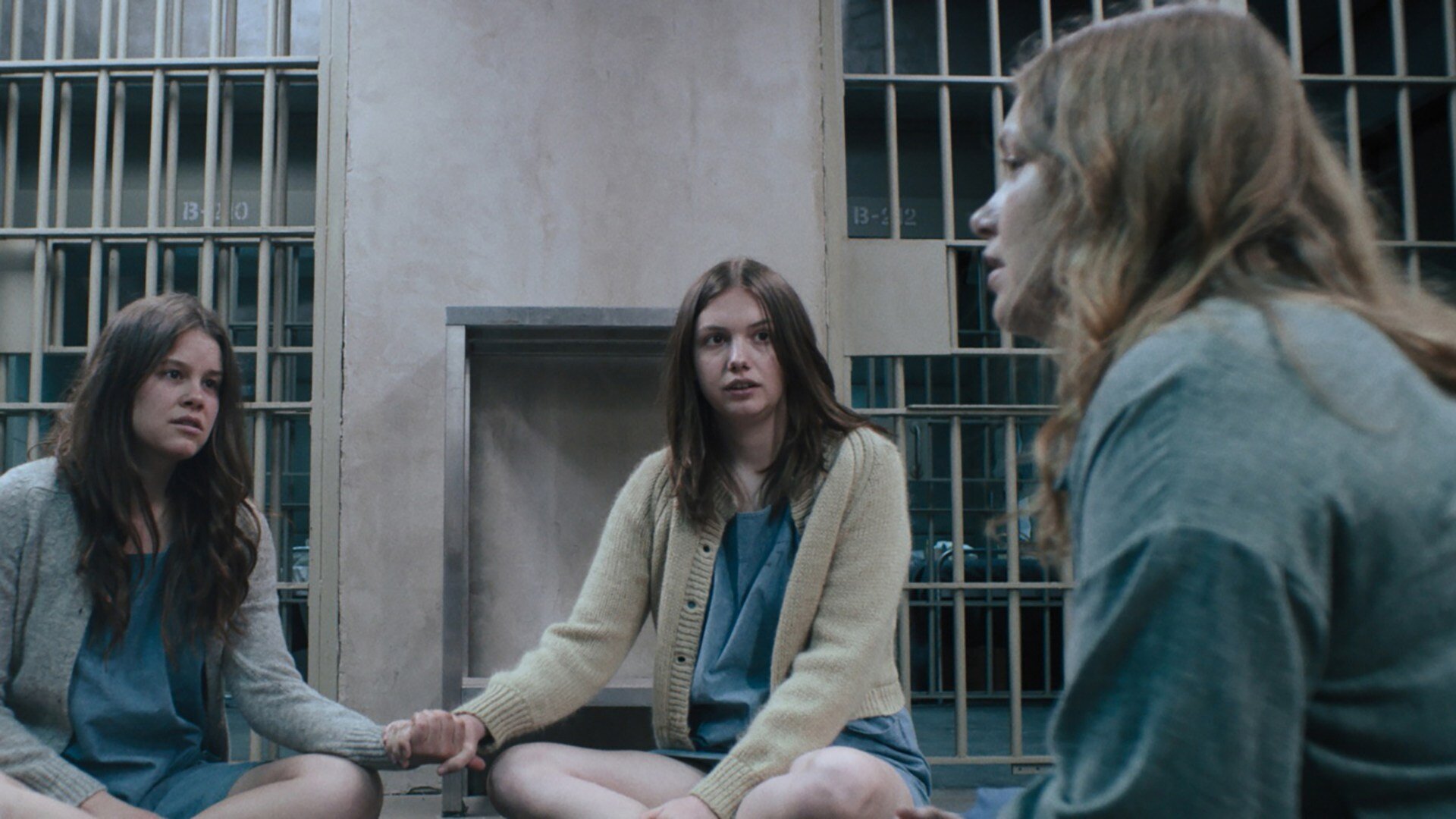[Film Review] Charlie Says (2018)
The Manson Family never fails to pique our obsession with cults and nostalgia for the swinging sixties. On the surface, everything about it captures the zeitgeist of 1960s counterculture: free love, LSD, hitchhiking hippies, The Beach Boys, Roman Polanski, California. Mary Harron’s biographical drama Charlie Says (2018) joins Emma Cline’s novel The Girls (2016) and Quentin Tarantino’s film Once Upon a Time…In Hollywood (2019) in reclaiming the women at the heart of the Manson murders, whether victims or perpetrators.
Years on from the crimes that shook Hollywood, including the brutal murder of actress Sharon Tate, three of the Manson Family women are incarcerated in a California penitentiary: Leslie Van Houten (Hannah Murray), Patricia Krenwinkel (Sosie Bacon) and Susan Atkins (Marianne Rendón). Their days are spent in isolation and delusion, unable to face the reality of their crimes. That is until a graduate student, Karlene Faith (Merritt Wever), takes pity on them. Through a women’s studies course, Karlene attempts to rehabilitate them by unravelling Manson’s apocalyptic dogma and reuniting them with their old selves.
Mainly told from the perspective of Leslie, the narrative is split between two timeframes: the present day at the California Institution for Women and theflashbacks to Manson’s ranch. The ranch scenes are by far the most compelling aspects of the film as it is here, we begin to understand why women drift towards Manson’s circle and find it so difficult to leave. To his followers, ‘Charlie’ is a leader, lover and father figure all rolled into one. He plays on the women’s deepest vulnerabilities by stripping them (sometimes quite literally) of their former selves and building them back up with empty mantras of self-love and body positivity. They stay loyal to Manson because he has hijacked their self-worth to the extent that they can’t imagine life without him.
Best known for his more clean-cut roles in Doctor Who (2009) and The Crown (2016-), Matt Smith is transformed as the deranged and dishevelled Charles Manson. In fact, he plays the character so brilliantly that at times you forget it’s Matt Smith. He captures Manson’s unpredictability with ease by switching seamlessly between intoxicating charm, fatherly affection and explosive rage. The film makes a spectacle of Charles’ failure as a musician, which is where we see his vulnerabilities bubbling below the surface and eventually spiralling out of control. The outrageous irony of Manson’s cult preaching ‘letting go of your ego’ while his own ego as a mediocre musician takes centre stage in some very uncomfortable gigs is both infuriating and laughable.
From her past success stories including American Psycho (2000) and I Shot Andy Warhol (1996), Harron’s feminist filmmaking has earned a reputation for exposing toxic masculinity and giving women back their voices. Charlie Says is no exception, holding a mirror up to the Manson Family’s inherent misogyny and double standards. The film counters Manson’s hippie philosophies of free love and living off the land by pointing out how women are given a raw deal in these situations. In Manson’s ‘no rules’ utopia, men eat first, women are beaten for answering back and their roles are reduced to cooking, sewing, looking after children and entertaining male visitors. Through Harron’s critical lens, this free-love-no-rules commune starts to look more like an ultra-Puritan hellscape straight out of The Handmaid’s Tale (2017).
When you strip away Manson’s toxic presence, what emerges from these scenes at the ranch is the genuine friendships between the women. Their bond is more than circumstantial, it is a bond of blood, flesh and family. A member of the Family (Mary) gives birth with an army of supporters around her, holding her hands and mopping her brow. One woman even bites through the umbilical cord with her teeth. This is not unlike the sense of belonging that Dani finds among the Hårga in Midsommar (2019), who share her pain and offer the emotional support that she’s missing in her everyday life. It would be a stretch to call it a female utopia, but there are certainly glimpses of a devoted sisterhood.
The problem with Charlie Says is that it’s a film of two mismatched halves. The prison narrative that should have been the film’s emotional pull is massively overshadowed by the bizarre goings on at Manson’s ranch. The idea of the Manson women coming to terms with their crimes through a women’s studies course has so much potential, but the execution is frustratingly bland because there is no real development in the characters. Even after years of incarceration, the women continue to regurgitate Manson’s philosophies in a state of childlike delusion to the extent that it becomes quite repetitive. The ranch narrative takes a deep dive into the emotional state of Manson’s newest recruit, with Hannah Murray’s standout performance as Leslie expressing the discomfort, fear, sadness and vulnerability of her character with expert subtlety. In the prison narrative, this fascinating depth is lost. Quite simply, the characters become too monotonous. In rehabilitating the women, Karlene reveals her hope that they will reconnect with who they were before they met Manson. If this is what the film aims to do, it doesn’t really succeed.
What the film does succeed in is opening up a discussion about victimhood. Beyond Karlene’s efforts, there is very little sympathy expressed towards the women, with other prison staff refusing to see them as ‘real victims’. Where young women, brainwashing and violent crimes are concerned, the topic of culpability is always polarising. One only needs to bring up the former Islamic State child bride Shamima Begum or female accomplices of male criminals to hear cries of ‘she knew what she was doing’ drowning out questions of accountability. Are the Manson women victims of a deranged psychopath’s manipulation or perpetrators of his violent ideologies? Can they be both? The film certainly raises the possibility of victimhood working on multiple levels and a second chance at life beyond Manson’s destructive influence.






![[Film Review] Flights of Reverie (2025)](https://images.squarespace-cdn.com/content/v1/5fe76a518d20536a3fbd7246/1769111579457-CTUW03G3J34P6SFRWWEM/flights-of-reverie-filmstill-ornithologist-berlin-li-wallis06.jpg)
![[Film Review] Confessions in Static (2025)](https://images.squarespace-cdn.com/content/v1/5fe76a518d20536a3fbd7246/1768397467245-3KOF3LUBRDQVJ8QVDONA/Confessions_Key_Alternate_1920x1080.png)
![[Film Review] Stalker (2025)](https://images.squarespace-cdn.com/content/v1/5fe76a518d20536a3fbd7246/1768232505839-TS9K7YBLOXNQML8PUWTP/Screenshot+2026-01-12+at+15.17.49.png)
![[Film Review] Bone Lake (2025)](https://images.squarespace-cdn.com/content/v1/5fe76a518d20536a3fbd7246/1768151214859-U1AUN7JALKRK4W5NGJVH/Andra+Nechita+and+Maddie+Hasson+in+Bone+Lake+%28Signature+Entertainment%29+1.jpg)
![[Film Review] 28 Years Later: The Bone Temple (2026)](https://images.squarespace-cdn.com/content/v1/5fe76a518d20536a3fbd7246/1768152692285-7TK6SN62JY4H3TJDYABP/The+Bone+temple.jpg)
![[Film Review] Pelverata (2025)](https://images.squarespace-cdn.com/content/v1/5fe76a518d20536a3fbd7246/1767549668681-1TW6BD7QQHK8WS8L4IVT/Screenshot+2026-01-04+at+17.57.01.png)
![[Film Review] A study of the human ability to endure self-inflicted pain in XXXDarknet: Red Lips](https://images.squarespace-cdn.com/content/v1/5fe76a518d20536a3fbd7246/1767542371615-YUJBD442MS9NAGEB45D7/redlips.jpg)














![[Editorial] Oscar Nominations 2026: Where to stream all the horror picks](https://images.squarespace-cdn.com/content/v1/5fe76a518d20536a3fbd7246/1769113319180-4INRRNMZK4DZLHRSUXX5/rev-1-GRC-TT-0026r_High_Res_JPEG-1024x372.jpeg)
![[Editorial] 10 Films & Events to Catch at Soho Horror Film Fest 2023](https://images.squarespace-cdn.com/content/v1/5fe76a518d20536a3fbd7246/1700819417135-299R7L4P0B676AD3RO1X/Screenshot+2023-11-24+at+09.41.52.png)
![[Editorial] 9 Horror Nintendo Switch Games To Play](https://images.squarespace-cdn.com/content/v1/5fe76a518d20536a3fbd7246/1697214470057-3XZXX8N4LYIMDFWS6Z3P/Screenshot+2023-10-13+at+17.20.13.png)
![[Mother of Fears] Mothering in Silence in A Quiet Place (2018)](https://images.squarespace-cdn.com/content/v1/5fe76a518d20536a3fbd7246/1696445921315-HZJ2DZYQIH6VVWXBO2YL/Screenshot+2023-10-04+at+19.52.29.png)
![[Editorial] 5 Female Focused Horror Book Recommendations](https://images.squarespace-cdn.com/content/v1/5fe76a518d20536a3fbd7246/1696441981361-52EQCTJ7AT2QF1927GM7/919xtm6d3fL._AC_UF894%2C1000_QL80_.jpg)
![[Editorial] 9 Best Slashers Released Within 10 Years of Scream (1996)](https://images.squarespace-cdn.com/content/v1/5fe76a518d20536a3fbd7246/1695478839037-LOFHGVM3H6BMSZW7G83M/Screenshot+2023-09-23+at+15.15.11.png)
![[Mother of Fears] Mother Vs. Monster in Silent Hill (2006)](https://images.squarespace-cdn.com/content/v1/5fe76a518d20536a3fbd7246/1695485781119-H6GNP0G3J2TLPAOIABV7/Screenshot+2023-09-23+at+17.11.56.png)
![[Editorial] 9 Terrifying Cerebral Visions in Horror Movies](https://images.squarespace-cdn.com/content/v1/5fe76a518d20536a3fbd7246/1693509801235-X23OL50T1DVGECH0ZJK2/MV5BMjQ0MTg2MjQ4MV5BMl5BanBnXkFtZTgwMTU3NDgxMTI%40._V1_.jpg)

The life of a Silent Hill fan is a turbulent one. For every Silent Hill 3, there’s a Silent Hill: Homecoming. For every Silent Hill 2 Remake, there’s a Silent Hill: Ascension. For every Silent Hill f, there’s a Return to Silent Hill, and thus, the pendulum continues to swing, this time into frustrating - but expected - disappointment.